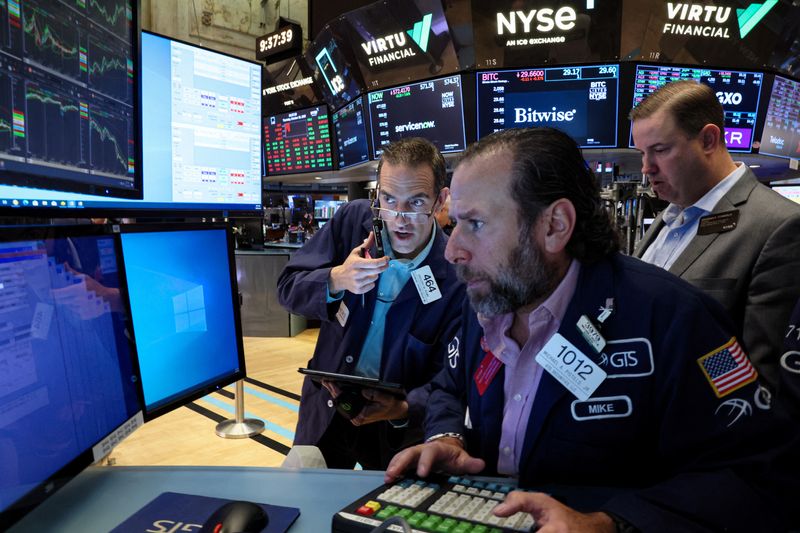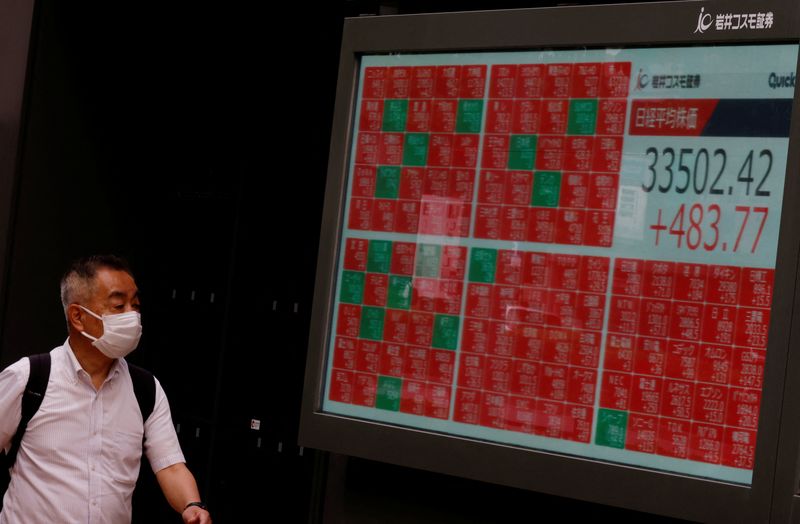By Herbert Lash
NEW YORK (Reuters) -Treasury yields jumped and a measure of global stocks fell on Thursday after Federal Reserve Chair Jerome Powell said policymakers "are not confident" interest rates are high enough to bring inflation down to the U.S. central bank's 2% target.
The fight to restore price stability "has a long way to go," Powell said in comments that delved into how he sees the final phase of fighting inflation unfold, with possibly more "disinflation" needing to come from an economic slowdown.
For some, Powell's comments were no different from last week when the Fed held interest rates steady, leading many in the market to surmise the rate hiking cycle was over. But some Fed officials have signaled otherwise as the economy remains strong.
Data showed the number of Americans filing new claims for unemployment benefits edged down last week, signaling layoffs remain low even as the jobs market shows some signs of cooling.
Richmond Fed President Thomas Barkin said on Thursday that while there has been "real progress" on inflation, he is still unsure if the Fed will need to push its policy rate higher to finish the job.
"The economy is not buckling under the current cost of capital, and if it's not, then what's the point?" said Phillip Colmar, global strategist at MRB Partners in New York, referring to expectations the Fed would ease policy after last week's jobs data. "There's no real case for the Fed to cut here."
The yield on 10-year notes rose 12.4 basis points (bps) to 4.632% and the two-year's yield, which reflects interest rate expectations, rose 9.9 bps to 5.035%.
Futures pushed the likelihood the Fed will keep its overnight lending rate above 5% through to next July from June, and reduced the size of rate cuts by year-end 2024 after Powell's comments.
A weak auction of $24 billion in 30-year Treasuries pushed yields higher before Powell's comments, and helped stocks on Wall Street move lower.
"The market was oversold before non-farm payrolls and the FOMC meeting (last week) and it was overbought before the auction," said Steven Ricchiuto, U.S. chief economist at Mizuho Securities USA LLC in New York.
"Basically, investors looked at where the pricing was and said I'm not as interested," Ricchiuto said about the auction.
The three major U.S. stock indices tumbled and snapped the longest winning streaks for the Nasdaq and S&P 500 in two years as market optimism over looser monetary policy faded.
MSCI's gauge of global stock performance closed down 0.31% after earlier trading almost 0.4% higher. The Dow Jones Industrial Average fell 0.65%, the S&P 500 lost 0.81% and the Nasdaq Composite dropped 0.94%.
Earlier in Europe, the pan-regional STOXX 600 index closed up 0.84%.
The dollar rose after yields moved higher.
Germany's benchmark 10-year borrowing cost rose 0.8 bps (bps) to 2.661%, up from a two-month low of 2.606% on Wednesday.
In Asia, Japan's Nikkei raced up 1.5%, thanks to solid earnings from Super Mario maker Nintendo and calculator and watch firm Casio and broad-based gains in the oil sector. (T)
China's property sector woes boomeranged back, though, with the main Hong Kong listed real estate index down 4% as embattled property giant Country Garden plunged nearly 10% on a blow to its rescue hopes. [.SS]
Chinese inflation figures for October also showed a 0.1% decline compared with September and a 0.2% year-on-year fall, pointing to still fragile demand in the world's second biggest economy.
The dollar gained 0.26% at 151.35 yen and the euro fell 0.40% at $1.0667. The dollar index, which tracks the greenback against a basket of currencies of major trading partners, rose 0.39% lower at 105.89.
The Brent crude oil benchmark closed above $80 a barrel after demand concerns and a fading war-risk premium had triggered a sell-off earlier this week.
Brent crude futures settled at $80.01 a barrel, a gain of 47 cents. U.S. West Texas Intermediate (WTI) crude futures settled at $75.74 a barrel up 41 cents, or 0.54%.

Gold rose as the dollar eased.
U.S. gold futures settled up 0.6% at $1,969.80 an ounce.
